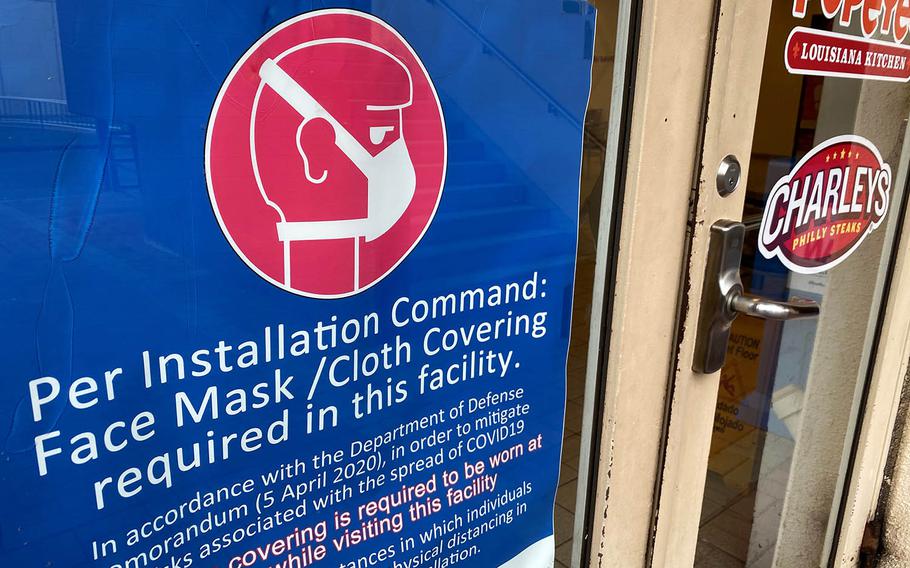
A sign posted outside the food court at Yokota Air Base in western Tokyo reminds patrons that masks are required inside the facility, Oct. 1, 2020. (Aaron Kidd/Stars and Stripes)
Stars and Stripes is making stories on the coronavirus pandemic available free of charge. See other free reports here. Sign up for our daily coronavirus newsletter here. Please support our journalism with a subscription.
TOKYO — The fall coronavirus surge in Japan pushed new cases in the capital city past 500 on Friday for a second consecutive day while U.S. military bases in the country reported 28 infections, 16 of them at Yokota Air Base.
The Tokyo Metropolitan Government recorded 522 new cases, just shy of the pandemic record of 534 set the previous day, according to public broadcaster NHK. The number of new daily infections has risen steadily from 87 on Nov. 2, according to metro government data.
Tokyo is off-limits to nearly everyone affiliated with the U.S. military, except those on official business.
In South Korea, the U.S. military command declared Seoul, the capital city, off-limits for 14 days beginning 6 p.m. Saturday due to “the increased number” of coronavirus cases in the country, according to a Facebook post by U.S. Forces Korea. Only those who live within the affected area or have official business there are exempt from the order.
The same order puts all saunas, bathhouses, fitness facilities and internet cafes on the peninsula off-limits for 30 days.
South Korea on Friday reported 363 new coronavirus cases, the third consecutive day of 300-plus new cases, according to the Ministry of Health and Welfare.
Back in Tokyo, Yokota, the home of the U.S. Forces Japan, announced Friday that another 16 people had tested positive for the coronavirus, bringing to 35 the total number of active cases at the air base. All new patients reported Friday were already in quarantine, according to the base.
The spike in infections is Yokota’s highest one-day total thus far, exceeding the previous high mark, 14, reached Wednesday.
However, base commander Col. Andrew Campbell in a minute-long video address Friday said he would impose no new restrictions beyond a handful announced Wednesday. He urged his personnel to observe basic measures already in place: wear a mask, social distance, wash hands and sanitize frequently, maintain a contact log and avoid non-mission essential social gatherings.
“As you know, I have the authority as the installation commander to increase restrictions to the fullest extent necessary,” Campbell said in the video posted on the base Facebook page.
“However, the most effective way to contain the virus spread is to diligently observe the protective measures we already have in place, and to hold one another accountable for everyone’s safety.”
Campbell, speaking Friday on American Forces Network Radio, described the “interactions that drove the current outbreak” as “closed, probably indoors, tightly knit social interactions, typically informal ones and often they’re ones that involve alcohol.”
Yokosuka Naval Base, south of Tokyo, reported eight new coronavirus cases Friday on its official Facebook page. The base has 20 active infections.
Four patients recently arrived in Japan and tested positive while still in quarantine; three others apparently acquired the virus locally and were tested after developing symptoms of COVID-19, the respiratory disease caused by the coronavirus, according to the naval base. The eighth individual tested positive during a medical screening.
Contacts of the four local cases are being traced; all eight are quarantined, the base said.
Naval Air Facility Atsugi, southwest of central Tokyo, on Friday reported two individuals infected with the coronavirus for a total of four active cases.
One person tested positive on a test administered by Japanese airport authorities; the other tested positive while in the two-week period of restricted movement, a form of quarantine required of new arrivals and travelers returning from abroad.
In 10 days, NAF Atsugi went from zero positive cases and 95 people in restricted movement to four cases and 245 people in restricted movement, said base commander Capt. Manning Montagnet during a Facebook Live town hall on Friday.
“The virus is blossoming and blooming all over the place,” he said.
Marine Corps Air Station Iwakuni, in western Japan, reported one new case, an individual already in isolation as a close contact of another patient.
As viral infections climb in the city of Iwakuni, base commander Col. Lance Lewis late Thursday posted new orders on the base Facebook page limiting his peoples’ contact with the local community until Nov. 30.
For example, air station personnel are limited to only essential services in the city, such as groceries, medical and dental care, Lewis wrote.
Parents who continue to send their children to local schools will be denied base access, he said. The base is working with the Iwakuni Education Board to provide those children all the homework they need for the next week.
“The last two weeks on- and off-base have shown how fast this virus spreads, and we cannot chance shutting down mandatory mission-based services on base by assuming more risk than necessary,” Lewis wrote.
Sasebo Naval Base in southern Japan reported one new coronavirus case, one of a group of new arrivals, according to a base Facebook post Friday. That person tested positive while still in the two-week quarantine.
Okinawa prefecture on Friday reported five new coronavirus cases at U.S. military bases on the island: four at Kadena Air Base and one at the Marine Corps’ Camp Hansen, a prefectural health official told Stars and Stripes by phone.
Meanwhile, the island prefecture, where the majority of U.S. troops are stationed, announced 40 new cases on Friday, according to the official.
Stars and Stripes reporters Matthew Keeler and Aya Ichihashi contributed to this report.
ditzler.joseph@stripes.com Twitter: @JosephDitzler